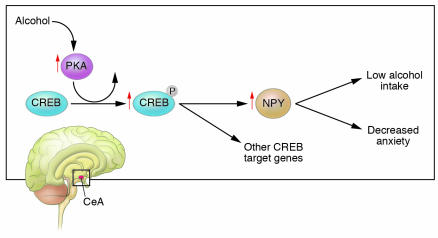Figure 1.
The amygdala and cAMP-dependent signaling. Located in the temporal lobe and forming part of the limbic system, the amygdala processes and then assigns emotional importance to specific sensory input. The amygdala has also been implicated in the generation of anxiety-like behaviors as well as mediation of the stress-dampening affects of alcohol. In this issue of the JCI, Pandey et al. (13) show that alcohol intake activated PKA signaling, resulting in increased phosphorylation of CREB and increased NPY expression in the CeA of P rats. These neurochemical changes were accompanied by decreased anxiety-like behavior. Not only were these observations mimicked by using a cAMP analog to activate PKA signaling, but alcohol self-administration in these rats was also reduced. To ensure proof of principle, the investigators infused a PKA inhibitor into the CeA of NP rats. In contrast to the results observed in P rats, the infusion provoked anxiety-like behaviors and increased alcohol intake. It appears that a CREB-dependent neuromechanism within the CeA may modulate anxiety-like behavior and alcohol intake. The findings provide a genetic model to understand how a neural substrate creates anxiety, which results in alcohol consumption to reverse a state of negative affect. The observations also open up new avenues in which to pursue pharmacological manipulation of CREB and/or NPY expression in order to modify heavy alcohol intake.

